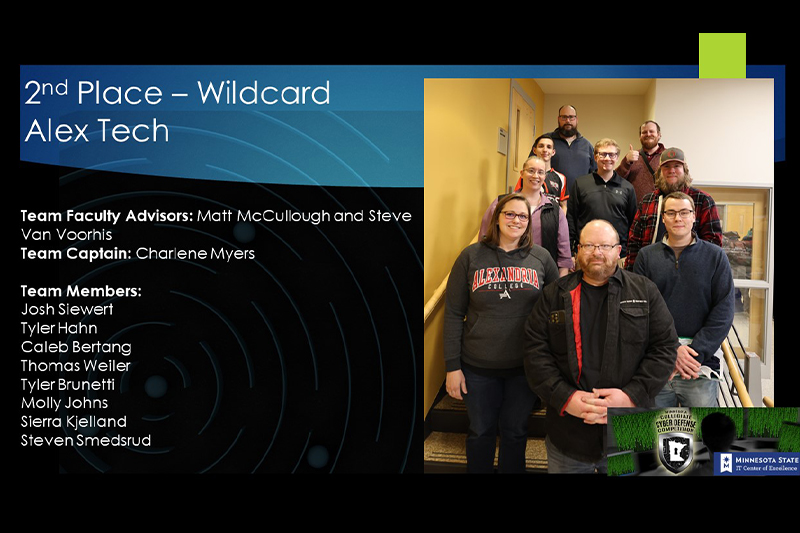Alexandria College takes second in Minnesota Collegiate Cyber Defense Competition.
More than 80 students from 8 different Minnesota State System institutions participated in this competitive skill-building event, hosted at Alexandria College.
The top three teams were:
- Pine Technical and Community College, Pine City, Minn.
- Alexandria Technical and Community College, Alexandria, Minn.
- Hennepin Technical College, Brooklyn Park, Minn.
The other participating teams were Minneapolis Community & Technical College, Metropolitan State University, Minnesota State Community and Technical College with MN State U, Moorhead; Minnesota State University, Mankato; and St. Cloud State University.
Alexandria College team members include Charlene Myers (team captain), Josh Siewert, Tyler Hahn, Caleb Bertang, Thomas Weiler, Tyler Brunetti, Molly Johns, Sierra Kjelland, and Steven Smedsrud. Faculty advisors are Matt McCullough, Steven Van Voorhis, and Vickie McLain.
Alexandria College will compete in the Midwest Wildcard on February 24, 2024. The wildcard event gives Alexandria College a chance to secure a spot to compete in the regional competition in March.
The CCDC consisted of a controlled virtual environment where competitors assume administrative and protective duties for an existing commercial network. The scenario was that the competitors worked for a small company with 50+ users, 7 to 10 servers, and standard Internet services such as a web server, mail server, and e-commerce site.
The following is an excerpt from the article, ATCC students compete in Collegiate Cyber Defense Competition with 7 other schools, by Celeste Edenloff, Echo Press.
“They pretty much get a clean slate,” said Janice Aanenson, the state director for the Collegiate Cyber Defense Competition and the executive director of the Minnesota State IT Center of Excellence. “They have to have secure networks, make sure their passwords are strong, make sure credit cards are secure, and whatever else goes with e-commerce stuff.”
Each team began the competition with the same hardware and software. Competitors were scored on their ability to detect and respond to outside threats, maintain the availability of existing services such as mail servers and web servers, respond to business requests, and balance security needs against business needs.
A volunteer “Red Team” (ethical hackers) provided the external threats which allowed the teams to match their defensive skills against live opponents, similar to a real-world hacking scenario.
“It’s called penetration testing because we want to make sure that the company can’t be breached, get hit with ransomware, or have their entire site taken down,” said Aanenson. “The student teams have to stop the hackers, make sure nothing happens, and again, they are scored on how they respond.”
Competitions like this allow students to face real-world challenges and threats in a safe competitive environment that cultivates learning and the growth of career skills.
Recent News:
-
From Classroom to Champion: Soo 500 Winner Vince Vanslyke's Legendary Journey
March 4, 2026 | 12:02 PM -
From Brief to Pitch in 12 Hours: ATCC Students Claim Design Challenge Victory
March 3, 2026 | 1:06 PM -
PTE Students Take the Plunge for Special Olympics
March 3, 2026 | 10:21 AM


